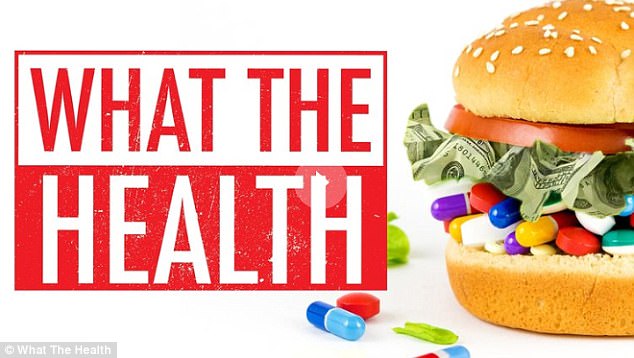Health expert hits out at preachy new Netflix documentary which urges viewers to turn vegan 'to survive modern life'
A new documentary urging people to ditch animal food products and start eating vegan is 'irresponsible' and 'misleading', according to a leading nutritionist.
What The Health, which debuted on Netflix in March, tells viewers that the is one healthy way to eat involving cutting out all animal products from our diet.
The documentary, a huge success on the streaming site, says that meat, fish, poultry and dairy are making us fat, giving us cancer, and poisoning us with toxins.
Directors Kip Andersen and Keegan Kuhn said their aim was to help Americans make healthier food choices.
But New York City dietitian and nutritionist Mary Jane Detroyer tells Daily Mail Online: 'It was one of the most poorly represented documentaries I've seen.'
Currently, America is experiencing obesity, diabetes and heart disease epidemics driven primarily by the Western diet. The Western diet, which is characterized by high fat and high sugar meals, has come under attack by nutritionists as the cause for these serious health problems.
But the film presents the facts in a way that misrepresents the information and scares people into thinking all of the food they eat is poison, Detroyer explained.
'A lot of what the information they presented was valid. For example, they make the claim that research conducted by the American Heart Association is paid for by food industries, which is real and is a problem,' she said.
'But on the other side of that, If these studies aren't supported by businesses, the research won't get done. It's a double edged sword.'
Detroyer walked us through her biggest problems with the documentary

New York City nutritionist and dietitian walks Daily Mail Online through her biggest problems with the new Netflix documentary What The Health
What The Health claims processed red meat causes diabetes
The documentary makes the claim that one serving of processed meat a day raises the risk of type 2 diabetes by 51 percent.
According to multiple studies, if you eat a highly processed red meat a day there is a 19 percent increased risk of developing diabetes.
'It's distorted science, and if you misrepresent something like that, I just can't trust anything you tell me,' Detroyer explained.The movie says eating one egg per day is as bad as smoking five cigarettes
'If as many people were dying from eating one single egg a day as they were from smoking cigarettes, we'd stop eating eggs,' Detroyer began.
'I can't for the life of me understand where they could have gotten that correlation.'
There are chemicals called dioxins in eggs, she explained, and that is a terrible problem.
However, she also said the chemicals get into the eggs through the ground, meaning they are in the plants we eat too.
'Obviously you should try to consume as little chemical product as possible, and it's definitely better to try and buy eggs that are produced organically, but that's not realistic,' she said.
'Especially for people in the lowest income bracket. Protein is an incredibly important part of someone's diet, and eggs are a cheap way to get that protein. It's not perfect, but it's not as dangerous as smoking five cigarettes a day.'The documentary-makers only spoke to doctors who shared their point of view
Detroyer said the producers only spoke to experts in the field who shared the same opinion they did and promote veganism to their patients.
'And there's nothing wrong with being vegan,' she explained. 'But it is just as possible to be unhealthy when you are vegan as it is when you are eating animal products.'
She also said when they did speak with doctors at the American Diabetes Association, they only asked about studies that were poorly done.
'There's a scene where he's speaking to these doctors from there [American Diabetes Association] and the doctors don't want to go into the studies. That's because those studies weren't good,' she said.
'Not all studies are good. There are a lot that are under funded or have really high limitations, and so of course they do't want to talk about them.'The film resisted exploring actual science in-depth
Detroyer said the film was choppy, quick, and used scare tactics instead of actual science to support their claims.
'The filmmakers bring up these things like how the water in our country is toxic and how fish is toxic, and that's true, but it's not as simple as they make it sound,' she explained.
She said she tells people that come to her practice only to eat fish if it is natural. Farm raised fish, she explained, is full of different chemicals that humans shouldn't be eating.
But, at the same time, the water those fish are swimming in is no different than what is used to grow plants.
'It's the same water that's in their tofu, so I don't know how that's any different,' she explained.
'I do think we should eat more vegetables, I highly recommend it in fact. But it's just not that simple and the vegan and vegetarian diets don't work for everyone.
'At the end of the day, the film was irresponsible and could negatively impact huge groups of people.'
One group, she explained, are those who already have disordered thoughts about food.
'It's just giving them an even bigger reason not to eat,' she said.
The other group are people who are in the lowest income bracket and rely on food stamps to buy a lot of their groceries.
'The film is going to scare these people into thinking that they can't eat anything, and that's simply untrue,' Detroyer explained.
'There are obviously a lot of other issues with the documentary, but ultimately I think that's the biggest takeaway.'